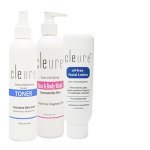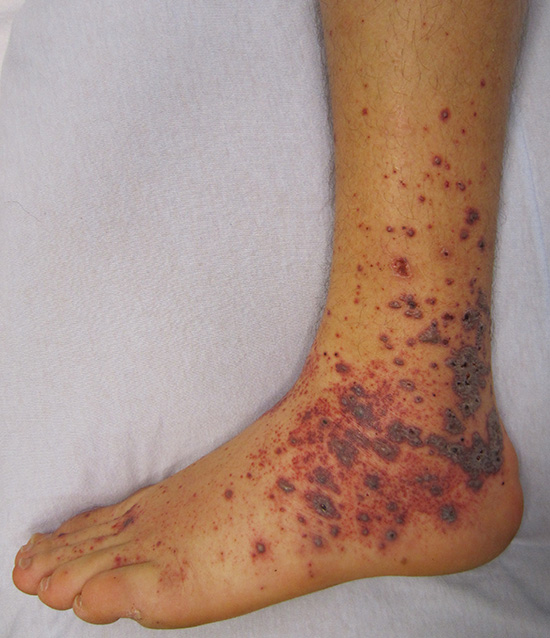Safe Cosmetics
How Skin Care Ingredients Affect Sensitive Skin
Safe cosmetics are an essential component of our unique My Sensitive Skin Care approach to natural beauty. Did you know that MOST toothpastes, personal care products, makeup and skin care products are filled with ingredients that can cause skin irritation, allergies, or even more serious health risks?

Some of these ingredients have even been shown in research to disrupt hormonal levels in the body, which is of great concern to young teenage women, menopausal women and anyone who is having trouble with sensitive skin.
Safe Cosmetics - Toxic Chemicals at Home
In addition, toxic chemicals exist in the cleaning products we use, and are even added to our clothing, rugs, furniture, building materials and so for. Most products on the market today also contain artificial fragrances which are among the top allergens in the world.
Despite these challenges, there are more opportunities now to choose safe cosmetics, and all you need is a few minutes to educate yourself, which will reap you many years of benefit both for your skin and your whole body.
Toxic Chemicals Even in Sensitive Skin Products
If you are struggling with sensitive skin, you may have discovered the hard way that even some of the products that are manufactured specifically for sensitive skin have ingredients that your body simply cannot tolerate.
In our research, we've discovered that very few hypoallergenic products on the market today can be considered safe cosmetics from the standpoint of the skin care ingredients they use, many of which are moderately to severely toxic.
Nowadays there are so many healthy and affordable options for safe cosmetics and non-toxic skin care and personal care products. If you have sensitive skin, there is no reason to continue using products with questionable ingredients.
Safe Cosmetics - A Helpful Guide to Creating a Clean and Pure Environment for Your Skin
When I first started learning about safe cosmetics, I found it really overwhelming. Thankfully I discovered a very helpful resource that helped me a great deal to check the ingredients lists of my skin care and personal care products to discover what research has been done on which ingredients. I will let you in on that wonderful discovery shortly.
In the meantime, it is best to start slowly, one step at a time. Start with the products that you use on your body. You definitely want to be using safe cosmetics as you absorb the ingredients that you put on your skin or in your mouth.
Look at the labels on your shampoo, conditioner, toothpaste, deodorant, nail polish, shaving cream and skin care products. Do they contain any of the following ingredients?
- Fragrance - considered one of the top 5 allergens in the world, fragrance is also a potent neurotoxin which means it is toxic to the brain. Many people who are sensitive can actually feel a dizzy, sick sensation in their head when they inhale a product with fragrance. If you have sensitive skin, avoid all products with added fragrance.
- Parabens like methlyparaben, butlyparaben and propylparaben - are used as preservatives in cosmetics, skin and hair care products and research has linked use of parabens with endocrine disruption, immunotoxicity (damage to the immune system), irritation to the skin, lungs and eyes, neurotoxicity, and has been banned for use in the European Union. Although there are varying levels of controvery around this question, I recommend that you avoid parabens and I believe they should not be included in safe cosmetics. See more information here at our paraben-free products page.
- Sodium Lauryl Sulfate - is also known as SLS and is found in most shampoos and toothpastes, also in mouthwashes, tooth whiteners, hair colorings, and in makeup. I was shocked to also discover this ingredient in many well known "natural" toothpastes. SLS has been shown in research to irritate skin, and be linked to cancer, disruption of the endocrine system, reproductive toxicity and neurotoxicity. Some people find they get canker sores when using SLS toothpastes.
- Propylene Glycol - is nearly non-toxic when taken in food, but has been shown to produce skin, eye and lung irritation and sensitivity at even very small doses of 2% when applied to the skin. Propylene Glycol is absorbed through all the layers of the skin and is found in many personal care and skin care products, sometimes in very large doses. It is linked to organ system toxicity and endocrine disruption.
- Petroleum or petroleum by-products - do you want to use products that are made in the same manufacturing facilities that your gasoline is made? Petroleum products are often contaminated with impurities that have been shown to cause cancer. There are so many more natural, effective and gentler ingredients you could use!
- Mercury based preservatives such as thimerosal can be highly toxic to the nervous system as well as irritating to the skin and the whole body. Thimerasol is used in vaccines, mascara and other eye related cosmetics, and can cause damage to the eyes with long term use.
It is also may be a carcinogen (cancer causing substance) and several research studies have found it to be toxic to the immune system, the reproductive system, the nervous system and other organ systems of the body. It is known to build up in the environment and in the bodies of wildlife, and has already been banned for use in Canada. - Formaldehyde-based preservatives such as DMDM hydantoin, diazolidinyl urea, imidazolidinyl urea, and quaternium-15, 2-bromo-2-nitropropane-1,3-diol, and sodium hydroxylmethylglycinate. These highly hazardous preservatives are found in a number of skin care, hair care and personal care products, pain relievers, baby wipes and in nail polish. These release formaldehyde which is carcinogenic and have been linked to cancer, developmental problems, endocrine disruption, allergies, immune system toxicity and more.
- Animal by products - are used in candles, soaps, lipsticks, shaving creams, cosmetics, hair colorings, wax paper, crayons, margarines, paints, rubber, lubricants and more. Besides the obvious ethical concerns, animal products can be contaminated with the hormones and chemicals given to the animals while they were alive. Some animal by products have been shown to build up in the body and in the food chain over many years and to cause eczema, blackheads and other allergic reactions. There are an abundance of more gentle ingredients that work just as well
- Phthalates - are found in cosmetics and many nail polishes, and can be inhaled as well as absorbed through the skin. These are used to stabilize fragrance and to help skin care products to cling to the skin.
Pthalates have been shown to cause male infertility and sperm damage, and can also affect fetal development. Pthalates build up in the body and have been found in very high amounts in women of childbearing age, and are prohibited in Europe. There are safe cosmetic and nail polish alternatives that do not contain Phthalates! - Toluene is a solvent used in nail polishes which has been determined to be unsafe by the International Fragrance Association Codes & Standards. Many research studies have found this ingredient to be potentially carcinogenic. Toluene causes skin, eye, and lung irritation, and should not be used by anyone with sensitive skin.
There are many research studies which show evidence that toluene may be toxic to the nervous system, the immune system, many organ systems of the body. It is toxic to the environment, can build up in the body and in the environment over time, and can cause dizziness when inhaled. - TEA and DEA are also known as Triethanolamine and Diethanolamine. They are added to products as foaming agents however research indicates they are known skin irritants which may be toxic to the immune system. When our immune system is stressed, we are more likely to develop skin problems. It also may be disruptive to the endocrine system, and some research points to potentially cancer causing effects.
- Some forms of Alcohol - is found in fragrances, nail products, facial and personal care products. Tends to be drying to the skin and strips away the natural protective mantle, leaving your vulnerable to bacteria and toxins. Many types of alcohol are irritating or even toxic, and can cause brown spots on the skin and premature aging.
Isopropyl alcohol, Benzyl alcohol and Denatured Alcohol are linked with birth defects, allergies, and have been shown to be occupational hazards for workers who are exposed to these every day, and to build up over time in body tissues and in the environment. Stearyl and cetearyl alcohol are waxes and do not have a harmful effect on the skin, and are used in many safe cosmetics. - Aluminum - used in cosmetics, facial and skin care products, sunscreens and deodorants. Aluminum has been shown to build up in the brain and contribute to Alzheimer's and other brain disorders. There are many non-toxic alternatives that are just as effective. For example there is a natural form of aluminum called Alum which is not absorbed by the body, but which is safely used in some hypoallergenic deodorant formulations.
- Mineral oil - is used in many skincare products because it is inexpensive. Mineral oil is a petroleum by-product that coats the skin to keep in moisture. It strips the natural oils from your skin so it actually causes chapping, dryness and premature aging.
Mineral oil clogs the pores, and does not allow the skin to breathe or to release toxins. Some people who have a bad case of acne find complete relief simply by switching to a non-mineral oil face cream.
Any type of mineral oil derivative can contain PAH's (Polycyclic Aromatic Hydrocarbons) which are known to cause cancer. Some say that it also interferes with your body's ability to absorb the fat soluable vitamins. There are so many healthier alternatives, stay away from mineral oil! - Triclosan - This is an anti-bacterial which is used in many hand soaps and skin care products. It is also used in weed killer products. When you wash your hands with triclosan, it does kill the bacteria on your hands, and also can be ingested and destroy the friendly bacteria in your digestive tract as well, thereby weakening your immune system and destroying the delicate balance of friendly flora in your intestines. There is also evidence suggesting that triclosan may contribute to creating strains of bacteria that are resistant to antibiotics.
- Rancid natural oils - The natural oils in your skincare products should be cold pressed, and they should not be used past their expiration date, or they will go rancid. When natural oils are heated, they lose many of their nutritional properties and product trans fatty acids which are toxic to the body.
This is not a complete list but will be helpful in getting you started towards freeing yourself from environmental toxins and developing a pure and clean environment with safe cosmetics which can support and nourish your sensitive skin.
Once you start reading the labels of your personal care products, you might be a bit shocked to discover that even some of your favorite natural skin care products also contain questionable or even toxic skin care ingredients!
More Great Safe Cosmetics Resources
If you'd like to learn the fastest and simplest way to check the safety of the ingredients in your cosmetics and personal care products, please request our free ebook Clear ANY Skin Problem Naturally which includes detailed and specific information on how to check both the ingredients and the brand names of your products.
This ebook also comes with free access to our VIP member's area which contains two additional free reports on safe cosmetics that you can download, save to your computer, and print for future reference!
Additional Resources
If you'd like to research more about the safety of cosmetic ingredients, and learn more about the work now being done to help create a safer and less toxic world, there are a number of great resources that can be helpful to you.
This is a short list of some of the resources I appreciate, and there are plenty more I haven't found yet. I welcome your recommendations for additional resources on safe cosmetics.
Why is it So Difficult to Choose Safer Alternatives for Hazardous Chemicals? from the Environmental Health Perspectives Journal, which is published by the United States Department of Health and Human services, and the National Institutes for Health, Environmental Health Sciences.
Columbia Center for Children’s Environmental Health is doing excellent work in conducting research worldwide on the effects of environmental pollution on children.
Lowell Center for Sustainable Production works on many fronts to promote the development of a safer and more environmentally responsible world, including their Sustainable Children’s Products Initiative.
Healthy Child, Healthy World is a non-profit organization that educates parents about the effects of environmental pollutants on children, and how to make healthier and safer choices.
Common Misconceptions in Contact Dermatitis Counseling from the Dermatology Online Journal - it's great to know that some doctors are starting to talk about these issues.
Home > Safe Cosmetics









New! Comments
Share your thoughts about what you just read! Leave me a comment in the box below.